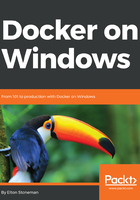
Learning Docker with this book
Every code listing in this book is accompanied by a full code sample on my GitHub repository at https://github.com/sixeyed/docker-on-windows. The source tree is organized into a folder for each chapter, and for each chapter there's a folder for each code sample. In this chapter, I've used two samples to create Docker images, which you'll find in ch01\ch01-whale and ch01\ch01-az.
I prefer to follow along with the code samples when I'm learning a new technology, but if you want to use working versions of the demo applications, every sample is also available as a public Docker image on Docker Cloud. Wherever you see a docker container run command, the image already exists on Docker Cloud, so you can use mine rather than building your own if you wish. All the images in the dockeronwindows organization, such as this chapter's dockeronwindows/ch01-whale—were built from the relevant Dockerfile in the GitHub repository.
My own development environment is based on Windows Server 2016, where I use Docker for Windows. My test environment is based on Windows Server 2016 Core, where I run Docker as a Windows Service. I've also verified all the code samples using Windows 10.
I'm using version 17.06 of Docker, which is the latest release at the time of writing. Some of the features I demonstrate need version 17.06 as a minimum--such as multi-stage builds and secrets. But Docker has always been backward-compatible, so if you're using a version later than 17.06, then the sample Dockerfiles and images should work in the same way.
My goal is for this to be a definitive book about Docker on Windows, so I've covered everything from the 101 on containers through modernizing .NET apps with Docker and the security implications of containers to CI/CD and administration in production. The book ends with a guide to moving forward with Docker in your own projects.